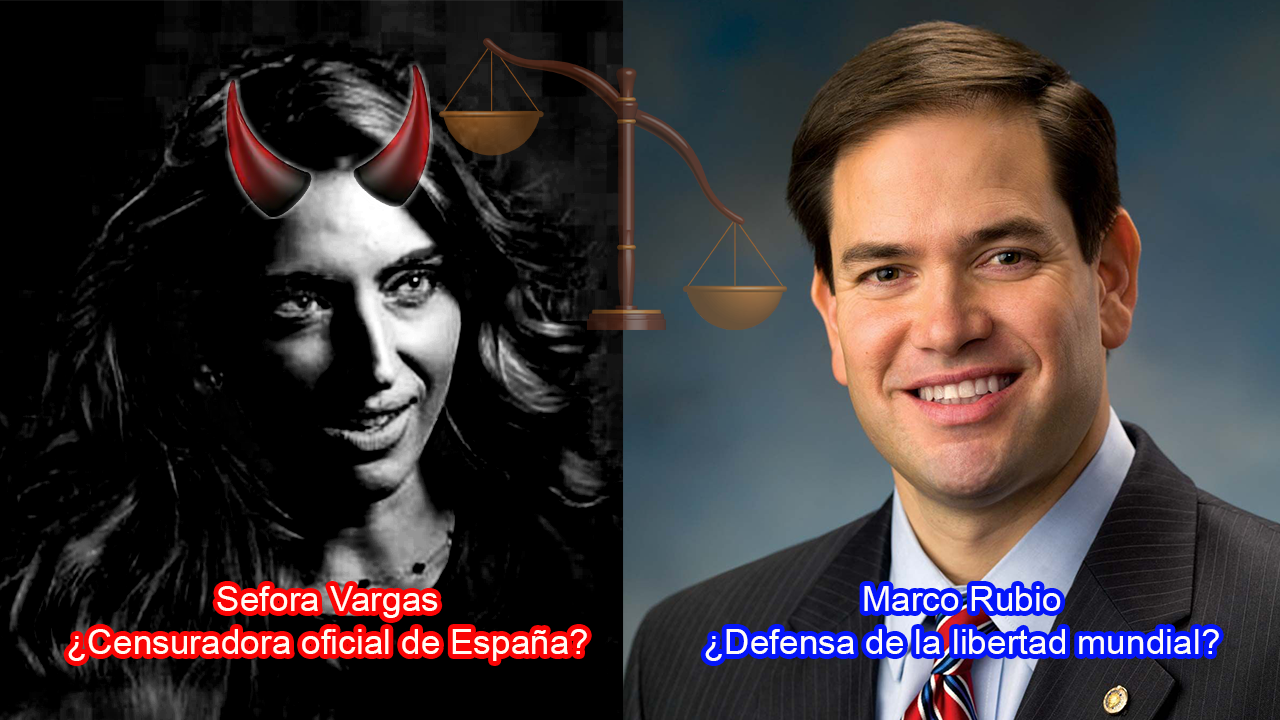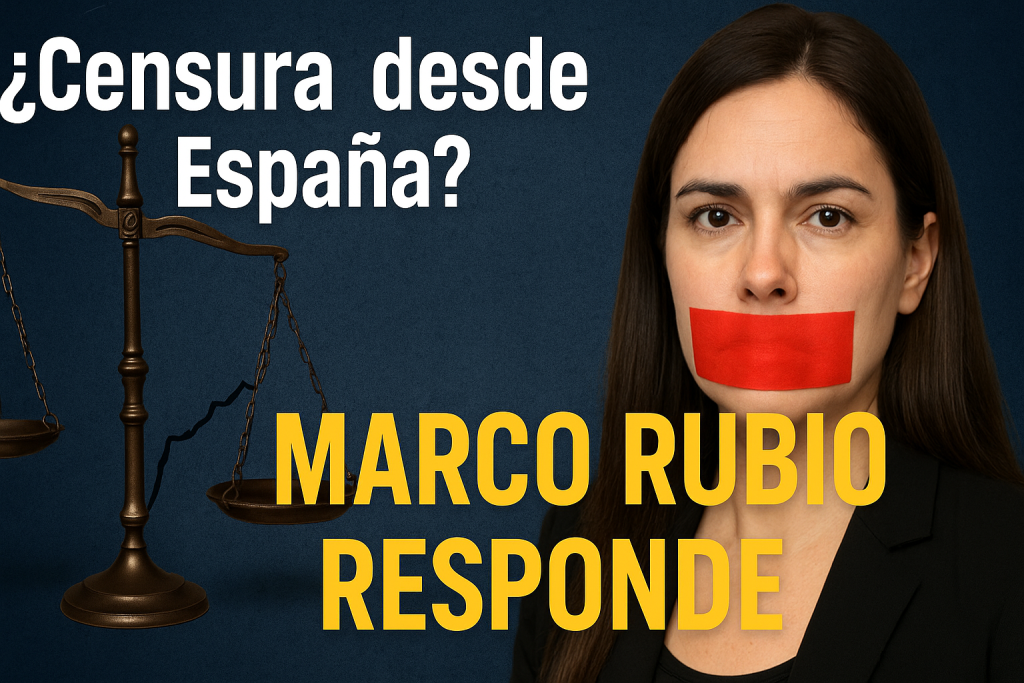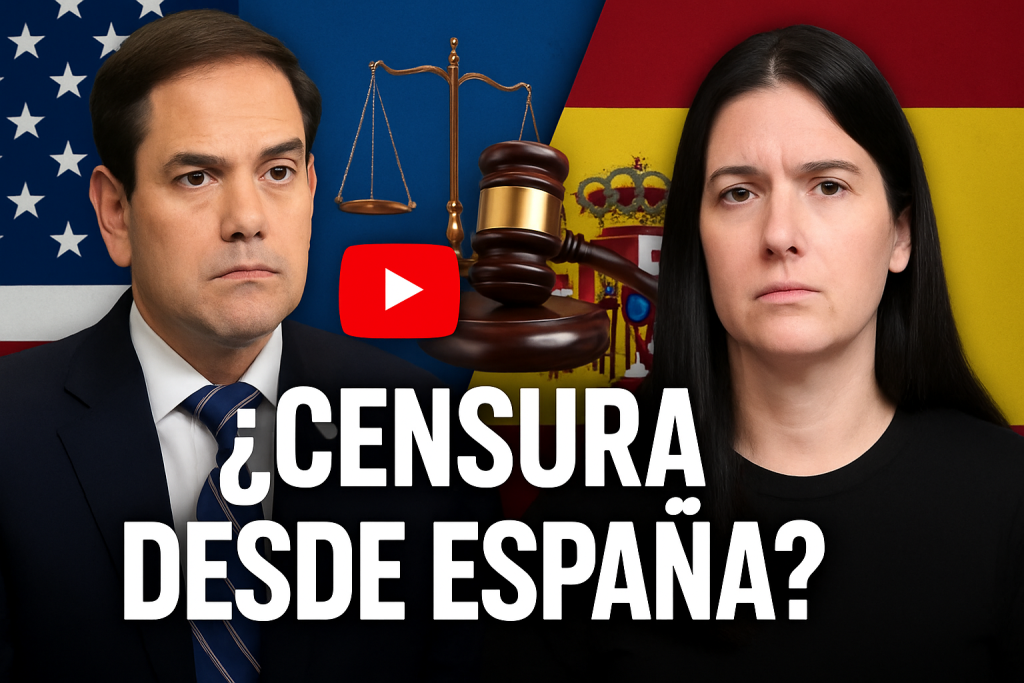
Séfora Vargas Marco Rubio
Marco Rubio and the Defense of Freedom of Expression: A Threat to Judicial Independence in Spain?
In a series of recent statements, US Senator Marco Rubio announced new visa restrictions targeting foreign officials who engage in censorship against US citizens. These measures have raised concerns in various sectors, especially in Europe, where there is a clear perception of a conflict between the judiciary and freedom of expression.
Rubio has affirmed that freedom of expression is a fundamental right that should not be restricted by foreign governments. In this regard, he declared that “freedom of expression is essential to the American way of life” and that “foreign governments do not have the authority” to restrict it. As part of this policy, visas will be revoked for those who pressure technology platforms to moderate content affecting US users or who issue arrest warrants for posts made in the United States.

This stance has generated tensions in Spain, where the A Coruña Prosecutor’s Office recently opened proceedings against YouTube lawyer Begoña Gerpe for an alleged hate crime against the Gypsy community. The complaint was filed by the Federation of Gypsy Women’s Associations (Fakali), led by Carmen Santiago, who accused Gerpe of making comments that incite hatred and discrimination on her YouTube channel, which has more than 223,000 subscribers and whose video doesn’t even come close to those expressed by Fakali, an association that allegedly receives significant state funding to commit these misdeeds. This accusation is clearly made to silence her.
Gerpe, for her part, has defended her comments, asserting that her statements are based on personal experiences and not generalizations about the Gypsy community. Despite the fact that the complaint has caused a stir, the case has not been closed and remains under investigation. The Civil Guard is analyzing the content of Gerpe’s channel, and the process continues with the possible opening of a trial. This fact has highlighted growing concern about the authorities’ intervention in regulating freedom of expression, even in a digital context.
However, the situation becomes even more complicated when considering the links between some of the figures involved in the complaint. It is being pointed out that the associations and individuals involved in promoting these complaints, such as the Kamira Federation, led by Carmen Santiago, and Séfora Vargas (who also plays a central role in regulating the alleged “hate law”), are carrying out an institutional cover-up that undermines the fundamental rights of freedom of expression. The application of this hate law is being used, according to various critics, to limit opinions that do not align with certain interests or political narratives.
These actions by organizations such as the Kamira Federation and the statements by figures such as Carmen Santiago and Séfora Vargas have been viewed by many as an attempt to restrict freedom of expression and foster selective censorship that persecutes those, like Gerpe, who dare to offer a critical view of certain groups or issues. The growing power of these entities in the judicial sphere appears to be protecting practices that violate citizens’ inalienable rights, a fact made clear in several recent cases.
Marco Rubio’s resolution is targeting precisely these individuals and entities. By promoting the creation of new sanctions against those responsible for censorship, the US senator has made it clear that he is willing to take action against those responsible for such abuses, especially when it comes to influencing the freedom of expression of US citizens. According to Rubio, officials involved in censorship or the persecution of freedom of expression cannot expect immunity if their actions violate the fundamental principles of the right to free expression.

The Gerpe case is just one of the recent examples that have alarmed international observers. As the Spanish government becomes involved in regulating speech on internet platforms, questions arise about judicial autonomy and the legal system’s ability to protect freedom of expression without resorting to censorship.
This situation is further complicated by the policies announced by Marco Rubio, which promise to sanction governments that interfere with the freedom of expression of American citizens. Gerpe’s case is an example of how the application of hate laws in Europe could clash with the norms and freedoms of other countries, including the United States.
Gerpe, for his part, has defended his comments, asserting that his remarks are based on personal experiences and not generalizations about the Gypsy community. Despite the fact that the complaint has caused a significant stir, the case has not been closed and remains under investigation. The Civil Guard is analyzing the content of Gerpe’s channel, and the process continues with the possible opening of a trial. This fact has highlighted growing concern about the intervention of authorities in the regulation of freedom of expression, even in a digital context.
However, the situation becomes even more complicated when considering the links between some of the figures implicated in the complaint. It is being pointed out that the associations and individuals involved in promoting these complaints, such as the Kamira Federation, led by Carmen Santiago, and Séfora Vargas (who also plays a central role in regulating the alleged “hate law”), are carrying out an institutional cover-up that undermines the fundamental rights of freedom of expression. According to various critics, the application of this hate speech law is being used to limit opinions that do not align with certain interests or political narratives.
These actions by organizations such as the Kamira Federation and the statements of figures such as Carmen Santiago and Séfora Vargas have been viewed by many as an attempt to restrict freedom of expression and foster selective censorship that persecutes those, like Gerpe, who dare to offer a critical view of certain groups or issues. The growing power of these entities in the judicial sphere appears to be protecting practices that violate the inalienable rights of citizens, a fact that has been made clear in several recent cases.
It is precisely these individuals and these entities that Marco Rubio’s resolution addresses. The US senator, by promoting the creation of new sanctions against those responsible for censorship, has made it clear that he is willing to take action against those responsible for such abuses, especially when it comes to influencing the freedom of expression of American citizens. According to Rubio, officials involved in censorship or the persecution of freedom of expression cannot expect immunity if their actions violate the fundamental principles of the right to free expression.
The Gerpe case is just one of the recent examples that have alarmed international observers. As the Spanish government becomes involved in regulating speech on internet platforms, questions arise about judicial autonomy and the legal system’s ability to protect freedom of expression without resorting to censorship.
This situation is further complicated by the policies announced by Marco Rubio, which promise to sanction governments that interfere with the freedom of expression of US citizens. The Gerpe case is an example of how the enforcement of hate speech laws in Europe could clash with the norms and freedoms of other countries, including the United States.
The imposition of restrictions on foreign officials by the United States could be seen as a threat to the judicial independence of European countries, such as Spain, and also as an attempt to force a selective censorship agenda that favors certain interests.
Although the defense of freedom of expression is a fundamental principle that must be protected internationally, any methods used to guarantee it must be carried out with courage. The intervention of foreign powers in national judicial systems could have repercussions not only on international relations, but all nations must protect their citizens, democracy, and social stability at all costs, as does the United States. The case of Begoña Gerpe, with its emphasis on hate crime laws, is a clear example of how the balance between the protection of rights and the restrictions imposed by authorities can become complex and controversial, but even more so, it can raise concerns that will ultimately correct the laws that have been constructed to violate them.
Disclaimer: This article and all articles are written in Miami, FL.
All articles are written by American citizens.





